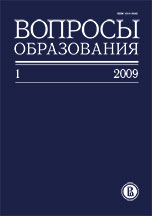Наиболее читаемые статьи этого автора (авторов)
- Галина Цукерман, Галина Ковалева, Марина Кузнецова, Победа в PIRLS и поражение в PISA: судьба читательской грамотности 10–15-летних школьников , Вопросы образования / Educational Studies Moscow: № 2 (2011)








